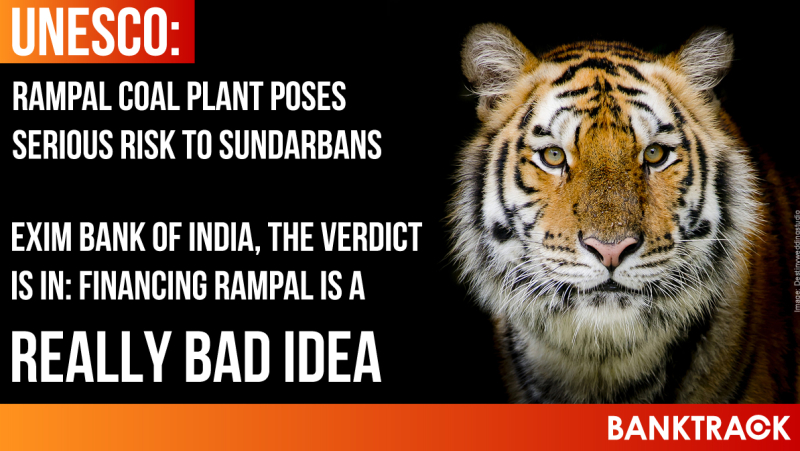UNESCO recommends cancellation of Rampal coal plant in Bangladesh, increasing reputation risk for Ex-Im Bank of India

A UNESCO monitoring mission report released today, recommending that the proposed Rampal coal plant project in Bangladesh be “cancelled and relocated to a more suitable location where it would not impact negatively on the Sundarbans Reserved Forest”, has been welcomed by BankTrack. The UN agency’s report findings presented to the Bangladeshi government have also increased pressure on the Export-Import Bank of India to reconsider a potential USD 1.6 billion loan for the project or risk taking a major reputational hit.
The report follows a fact-finding mission to Bangladesh in March this year undertaken by the Secretariat of UNESCO’s World Heritage Committee and the International Union for the Conservation of Nature to assess the risks of proposed coal power projects on the Sundarbans, the world’s largest mangrove forest and a designated UNESCO World Heritage site.
The ‘cancel and relocate’ Rampal recommendation to the Bangladeshi government is based on a catalogue of egregious shortcomings and risks which, as the report describes in extensive detail, stem from the Rampal project promoter’s inadequate assessment of the 1320 megawatt coal plant’s environmental impacts on the Sundarbans.
The proposed financing of the estimated USD 2 billion coal plant involves a 30% equity investment from the promoter, the Bangladesh-India Friendship Power Company, a joint venture between India’s National Thermal Power Corporation and the Bangladesh Power Development Board, and 70% debt financing from the Export-Import Bank of India, majority owned by the Indian state.
To date, no other major international bank has been prepared to get involved in debt financing for the Rampal plant. With media reports suggesting that the Export-Import Bank of India has been aiming for financial close on the project by the third quarter of 2016 , the bank’s chairman and managing director, Yaduvendra Mathur, acknowledged in June this year that participation in the project could involve a reputation risk.
Johan Frijns, director of BankTrack, said: “The UNESCO recommendation that the Rampal coal plant should be cancelled is very welcome news for the Sundarbans. Ex-Im India needs to consider the report’s findings seriously and in good faith rather than ignoring them.
“There is a reason why no major international bank has been prepared to go near Rampal. It’s called ‘fatal blow to reputation’ and that blow has now arrived via this damning UNESCO report. The threats posed to the wondrous, unique Sundarbans ecosystem by this coal plant, and the inevitable cumulative air and water pollution it will deliver, have been known for years. Ex-Im India must heed these objective warnings and not finance the project or its reputation will be seriously compromised in the eyes of the international investors on which it relies for funding."
Greig Aitken, BankTrack's coal campaigner, said: “We are also very concerned about the worsening atmosphere of intimidation that is being directed towards opponents of the Rampal project. The Government of Bangladesh has to accept that many people in the country do not want to see the Sundarbans tarnished by this highly questionable investment, and they have a fundamental democratic right to voice their concerns without harassment, fear of reprisals and unfounded allegations which place lives in danger.”
Notes for editors:
1. See the new UNESCO monitoring mission report,
2. See page 4 of the June 2016 report ‘Risky and over-subsidised: A financial analysis of the Rampal power plant’ by the Institute for Energy Economics and Financial Analysis.
3. See news article reporting Rampal project financial closure by October 2016.
4. See comments from Ex-Im's Yaduvendra Mathur, June 2016.
5. Last week the eminent Bangladeshi intellectual and economist Professor Anu Muhammad received a death threat connected to his opposition to the Rampal project. On October 9, it was reported that Bangladesh’s Minister of Power alleges that ‘most of the protestors’ against Rampal have links to Jamaat-e-Islami, an extremist Bangladeshi Islamist group.

